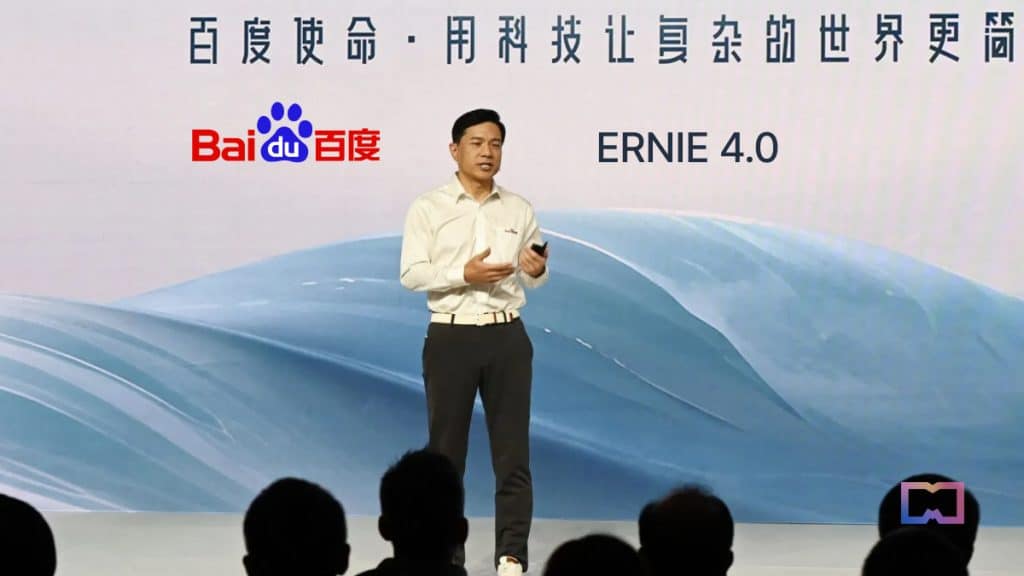Robin Li's unveiling of Ernie 4.0 marks a significant moment in the competition with OpenAI's achievements in generative AI.
In Brief
During the annual World Conference in Beijing, Robin Li proudly presented Baidu's latest generative AI innovation, known as Ernie 4.0.

At Baidu In Beijing's World Conference, Robin Li — CEO of Baidu The presentation highlighted the impressive capabilities of Ernie 4.0 in generating content, with Li explaining how this new version can compose novels, craft marketing materials, and create videos in mere minutes. However, some experts attending the conference voiced skepticism, suggesting that the updates in Ernie 4.0 may not be as groundbreaking as anticipated when compared to its earlier version. OpenAI’s GPT-4 .
Baidu also made several noteworthy announcements, revealing a plan to integrate generative AI functionalities into its full suite of products, which includes Baidu Drive and Baidu Maps. During the event, Baidu's Chief Technology Officer, Wang Haifeng, noted that since its public launch, Ernie has attracted 45 million users. In the stock market, Baidu's shares dipped by 1.32% during early trading, contrasting with the 0.7% increase of the broader Hang Seng Index.
Baidu Maps Powered By Generative AI
In the demonstration, CEO Robin Li highlighted the newly enhanced capabilities of Baidu Maps, which can now execute user commands through natural language queries thanks to Ernie's advanced technology. This advancement allows users to navigate seamlessly without wading through numerous options.
As a front-runner in China's internet search engine landscape, Baidu is committed to leading the competitive race in generative AI models.
The burgeoning AI race in China is fueled by a global intrigue to compete against Open AI's ChatGPT. Interestingly, Baidu had previously launched ErnieBot, a conversational AI utilizing Ernie's features, but early enthusiasm from investors dwindled after a series of pre-recorded showcases. This past August, the company received governmental approval for the public release of its AI products. With an impressive total of 130 large language models (LLMs), China now accounts for 40% of the global market, trailing only behind the United States, which holds 50%. Recently, Beijing introduced proposed regulations aimed at AI service providers, including a list of restricted sources that cannot be utilized for training AI models. Such measures emphasize China's dedication to ensuring safety and enhancing its foothold in the AI sector.
Please remember, the information presented on this page is not intended as legal, investment, financial, or any other type of advice. It's crucial to invest responsibly and seek personalized financial counsel if you have any reservations. For additional details, we recommend checking the terms and conditions along with the support sections provided by the relevant issuer or advertiser. Metaverse Post is dedicated to delivering accurate and impartial news; however, market conditions may change unexpectedly.
Victor serves as the Managing Tech Editor/Writer at Metaverse Post, focusing on artificial intelligence, cryptocurrency, data science, the metaverse, and cybersecurity in the enterprise sector. He has accumulated nearly five years of expertise in media and AI, working with prominent platforms like VentureBeat and Analytics India Magazine. An educator at prestigious institutions such as Oxford and USC, and holding a Master’s degree in data science, Victor is passionately engaged with the latest trends. AI regulation He provides readers with the most informative and cutting-edge stories in the Tech and Web3 realms.
Disclaimer
In line with the Trust Project guidelines Shardeum Boosts Validator Capacity and Reveals Its Autoscaling Mainnet Plan







